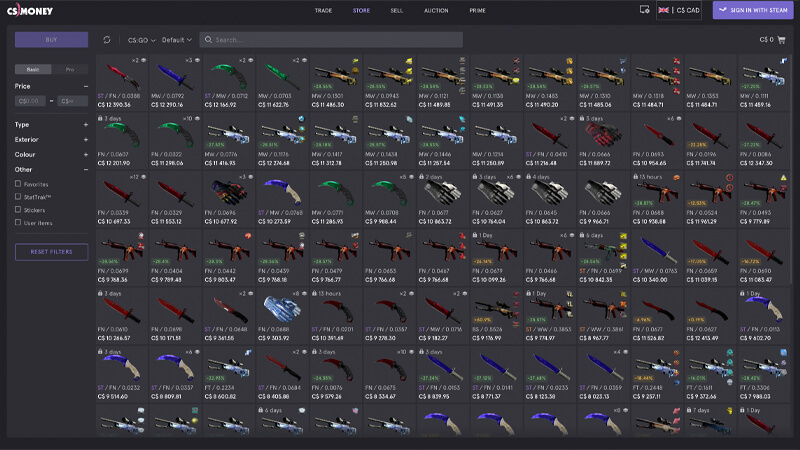Today, you’d assume that all CS2 ‘betting’ is done through traditional means – using cash to finance a wallet on a betting site, right? As an esports bettor, you’d sign up to any given platform, fund your wallet, and get stuck into CS2 betting, scanning the markets for the best opportunities.
While that’s probably the easiest and most accessible way to bet on CS2, there are other methods. Primarily, there’s CS2 skin gambling, a rather revolutionary and widely debated method for betting on CS2. Since 2013, fans of Counter-Strike: Global Offensive have been exploring this practice, but it hasn’t always been plain sailing.
To put it simply, CS2 skin gambling uses in-game cosmetic items, otherwise known as skins, as currency. These skins would have been earned in-game or traded from other players, then used as currency on a CS2 skin betting website.
Essentially, this is how the first CS2 trading sites came around, but within a short period of time, players learned that their skins boasted a real-world monetary value. Eventually, this led to the development of what some people call ‘CS2 Skinpay‘. This is where players will raise cash funds by trading CS2 skins, ultimately using the money to place bets.
So, if you are new to the world of CS2 skins gambling, what is it that you need to know to enjoy it safely? Let’s begin by answering a couple of key questions.

What Are Counter-Strike 2 Trading Sites?
CS2 trading sites are very simple – they’re digital locations where you can trade CS2 skins, often for real-world money. However, they can be broken down into two different ‘types’:
- Cryptocurrency-based sites – These sites will exchange your skins for cryptocurrency and for this you must obviously have a cryptocurrency wallet to receive your funds.
- Real Money-based sites – These sites will exchange your skins for real cash, based on the currency used in the country in which you live. You can then use this cash to bet with.
Firstly, let’s highlight the key difference between these two sites: security. When you’re using a real money-based website or platform, you’ll be working with the highest level of safety, security, and reliability. Although cryptocurrency-based platforms aren’t dangerous, they’re less safe than a real-money platform.
Let’s break down a simple explanation for why this is.
Valve, the developer of CS2 , has been actively working for many years to shut down unregulated skins gambling sites that operate in this way. Furthermore, a number of crypto-based sites have seen players lose skins that they deposit as the site has subsequently shut down with users still registered.
Ultimately, we don’t feel that cryptocurrency-based sites offer plays the sheer levels of security they need – and deserve – to safely trade their skins. Throughout the last decade, these unregulated platforms have exhibited countless issues, such as underage gambling.
Therefore, using real-money sites is a much better option, bringing with it the requirement to verify your identity. This aids the platform in checking your geographical location and of course, your age. However, this process isn’t much of a blocker, and signing up to platforms like Unikrn, GG.bet, Winners.bet, and more is relatively simple.
Typically, these platforms boast dynamic flexibility when it comes to trading skins for real cash. Furthermore, they boast extensive esports betting markets that you can bet on with the cash secured from trading CS2 skins.
The other massive benefit experienced by using these providers is that they operate under strict regulations and under license from the relevant authorities in the country in which you live. That means you can be sure your cash and skins are fully protected.
[cta id=2581 type=geo]
Are CS2 Trading Sites Legal?
It might sound like a wishy-washy answer, but there’s simply no definitive ‘yes or no’ ending here. There are many legitimate operators in the space, but Valve has shown on numerous occasions that it is keen to put a stop to as many unregulated sites as possible. In truth, it’ll remain a grey area for many years to come.
Although, if Valve were to shut down all CS2 trading sites, it would effectively need to stop creating in-game skins, shutting the market down entirely. This is the driving reason behind many claiming that Valve ‘secretly supports’ the practice, particularly as the CS2 skins market is worth some $5 billion.
Ultimately, while you won’t be prosecuted or pursued for using CS2 betting sites, you have to understand that you’re doing so without any regulatory protection. If at all possible, seek out the most reputable, regulated platform you can.

How Do I Complete A CS2 Skinpay Trade?
Unfortunately, the process required for completing a Counter-Strike 2 skin trade, or ‘skinpay’ trade is relatively simple. It’s one of the main reasons that underage gambling became so prevalent in this space. Firstly, you’ll need to open an account with a provider, then log into your Steam account, and pull the skins over to the gambling platform.
At this point, the skins will be sitting in a ‘wallet’ on the betting site. Alternatively, you can often directly trade the skin/s for on-platform currency. Then, you’re free to place bets as you so desire, using either skins or cash. If you’re successful in your wagers, the pay-out will be issued accordingly – either in cash or skins. If you’ve chosen to withdraw skins, these can be transferred back into your Steam account, or they can be used to purchase more gambling funds.
We’ll issue a final warning: this practice is unregulated and not safe. If you’re going to use CS2 trading sites, please do so very carefully and use the most responsible operator possible. Right now, we’ll advise that you retain your skins, keep them safe on Steam, and wait until a regulatory body steps up to take control of the market.
Read Also: CS2 Trade Up Simulator























